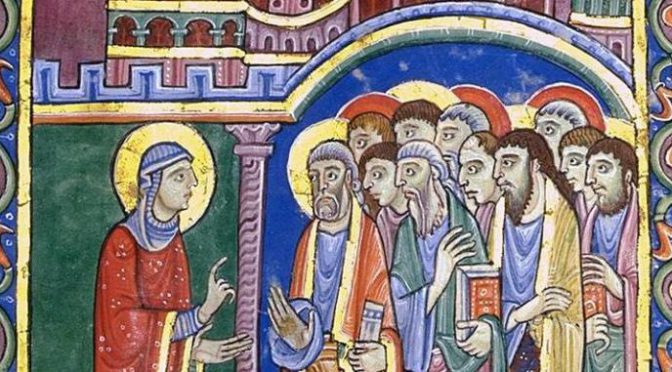By Fran Allfrey and Beth Whalley
After our first Wikipedia Edit-a-thon in March 2018, we always had in the back of our minds that we wanted to host another wikithon. And while the pandemic has put paid to any in-person meet-ups for the past eight months, we thought we would make the most of this period of physical distancing to gather participants from across multiple time zones and engage in some collective, virtual editing! Thanks to the generous support of Temporal Communities at Freie Universität Berlin, 16 of us were able to get together on the 28th October for three hours of training, discussing, and editing, all done via Zoom. See below for our outcomes.

Plenty has happened since we first set up our MedievalWiki project page. For both of us, who predominately work with early English literary culture, the last year or so has been characterised by the vital, field-changing conversations regarding the use of the term “Anglo-Saxon” (take a look at Mary Rambaran-Olm’s three-part series on this) and the exclusionary histories of medieval studies more broadly. Most agree that immense change is needed – and we think that making Wikipedia a less homogeneous space might be one possible means of pushing the field forwards.
We originally built #MedievalWiki for International Women’s Day, to respond specifically to the Wikipedia Gender Gap, but in light of these recent discussions, we’ve decided to refine the aims of the project. We want to both signal-boost the brave work of scholars past and present, and to make the stories of historically marginalised figures available to a wider public of readers. Our three aims are:
- to improve references to scholarly work by Black medievalists and medievalists of colour, women and non-binary medievalists in articles related to medieval studies;
- to create and improve biographical pages for Black medievalists, medievalists of colour, women and non-binary medieval scholars and artists who use medieval texts, objects, or themes in their work / create works of medievalism;
- to improve coverage of references to theories and interventions indebted to critical race, gender studies, queer studies, and sexuality studies in medieval historical Wikipedia articles.
Change in the academy is slow and change on Wikipedia, in school curriculums and in public discourse can be slower still. Nevertheless, we will continue to chip away and do what we can – and we need your help! We formalised the #MedievalWiki project page, but it is not owned by us, and if you subscribe to the above aims and want to make some edits of your own then consider yourself part of the #MedievalWiki family.
Edit-a-thon Outcomes
Several of our participants for this session were first-time Wikipedians. Wikipedia can certainly be overwhelming for the new user, but we were lucky enough to have Richard Nevell from Wikimedia on hand to walk us through the basics: where do I begin, what makes a good article, and what does the Wikipedia community expect from me? Richard also gave us a great bit of insight into the ways in which Wikipedia shapes knowledge, by actually influencing the language used in science papers.
Between our 16 participants, 7 different articles were edited, including the Society for Medieval Feminist Scholarship, Caedmon, Mathilde, Abbess of Essen and Anglo-Saxon Riddles. Four brand new articles were created: biographies for Haruko Momma, Fatima al-Suqutriyya, Aleksandra McClain, and Tamta Mqargrdzeli. In progress are two translations of articles into English, alongside biographies of Anneliese Maier and Hind bint al-Khuss al-Iyādiyya. We think that’s pretty impressive for three hours of work, and we’re really excited by the diverse range of people and topics addressed.
The brilliant Lucy Moore also created an automatically-updating Wikidata Redlist of medieval women 400-1600: this is a great place to begin if you’re considering creating your first biography.
We finished up the session by discussing where this work might take us. Victoria Leonard popped in to tell us about some of the brilliant, regular work that the Women’s Classical Committee are already doing, and we’ll certainly be teaming up with them in the future. We also thought about how we might be able to use Wikipedia in our teaching – while we often encourage our students not to use Wikipedia for their work, the reality is that many do. There are some medievalists in the UK, we learnt, who set their students the task of creating their own pages as a means of getting them to think critically about information available online. This seems to us like a really interesting way of combatting misinformation and promoting digital literacy amongst our students.
If you’d like to get involved with #MedievalWiki – either by collaborating with us on an event or by organising one of your own – you can tweet us @francheskyia and @beth_whalley.
Header image: Mary Magdalene announces the Risen Christ, the St Alban’s Psalter.
This post was originally shared at medievalwomenwiki.wordpress.com/2020/11/05/medievalwiki-october-2020-write-up/
Blog posts on King’s English represent the views of the individual authors and neither those of the English Department, nor of King’s College London.
You may also like to read:
- The heterogeneous nature of manuscript recipe books in early modern England
- Chaucer’s Own Scribe? Adam Pynkhurst and the Production of Middle English Literature
- Penned it wins a sacred grace: John Donne and the Melford Manuscript

